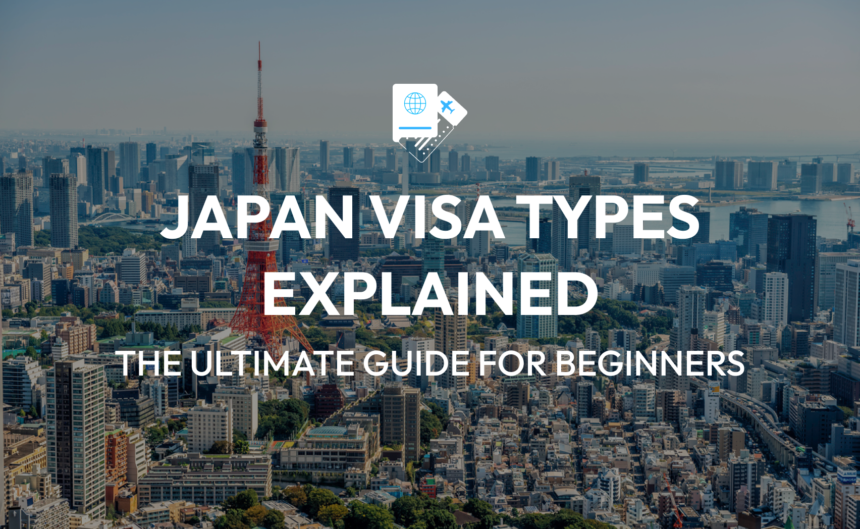If you’re thinking about moving to Japan, figuring out the right visa for the correct residence status is a crucial first step. Each visa category outlines what activities you can legally engage in and how long you’re allowed to stay. In this article, we’ll introduce the main types of Japanese visas, helping you decide which one best fits your goals.
Overview of Japan’s Visa Categories
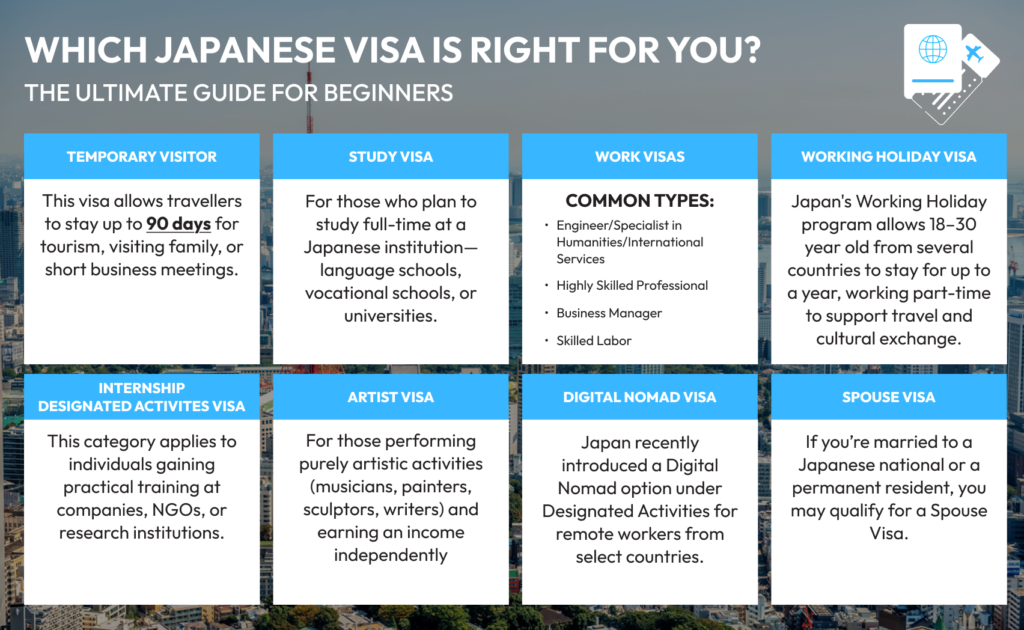
Japan’s visa categories are defined by the Immigration Services Agency, a department of the Ministry of Justice. In total, there are 29 different statuses of residence, ranging from short-term stays to permanent residency. Below is an overview of the major groups.
Diplomatic & Official Visas
These are for foreign government officials, diplomats, and their families.
- Diplomatic Visa
- Official Visa
Work & Professional Visas
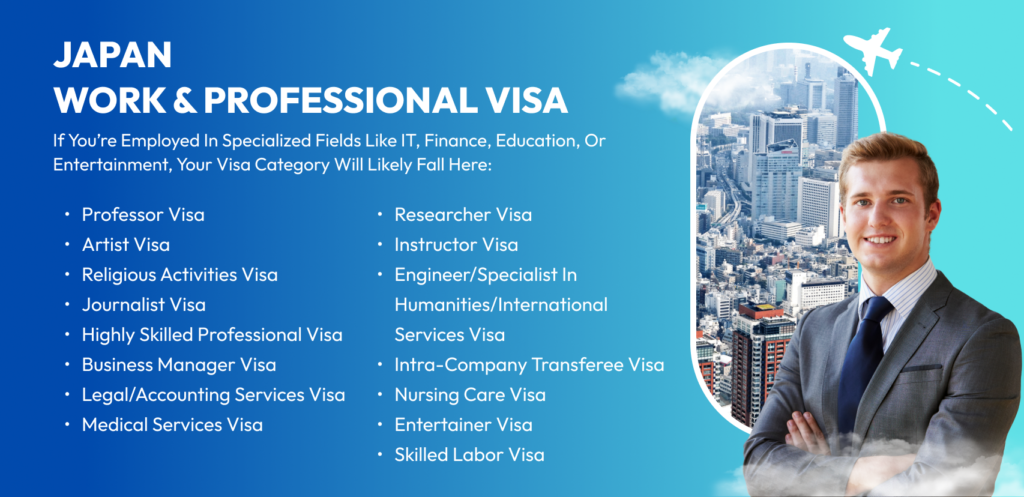
If you’re employed in specialized fields like IT, finance, education, or entertainment, your visa category will likely fall here.
- Professor Visa
- Artist Visa
- Religious Activities Visa
- Journalist Visa
- Highly Skilled Professional Visa
- Business Manager Visa
- Legal/Accounting Services Visa
- Medical Services Visa
- Researcher Visa
- Instructor Visa
- Engineer/Specialist in Humanities/International Services Visa
- Intra-Company Transferee Visa
- Nursing Care Visa
- Entertainer Visa
- Skilled Labor Visa
Non-Work & Cultural Visas
These typically limit full-time employment but allow study, cultural exchange, or short-term visits.
- Cultural Activities Visa
- Student Visa
- Trainee Visa
- Dependent Visa (for family members)
Special Condition Visas
These categories cover specialized needs, such as designated internships or industries with labor shortages.
- Specified Skilled Worker Visa
- Technical Intern Training Visa
- Designated Activities Visa (including certain internships, working holidays, digital nomads, and other specific cases)
Long-Term Residence Visas
These allow extended or indefinite stays, often with broader work permissions.
- Permanent Resident Visa
- Spouse/Child of Japanese National Visa
- Spouse/Child of Permanent Resident Visa
- Long-Term Resident Visa
Temporary Visitor (Tourist) Visa
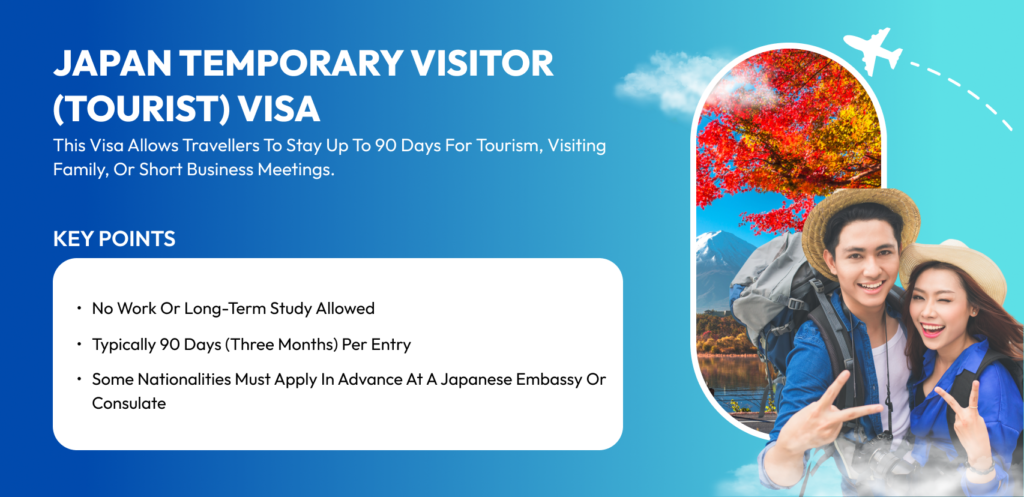
This visa allows travellers to stay up to 90 days for tourism, visiting family, or short business meetings. Thanks to visa-waiver agreements Japan has with many countries, such as the USA, UK, Australia, Canada, and more, you do not need to apply for a specific visa, though you will need to fill out a form for customs indicating where you are intending to stay, what you are bringing into the country, any past criminal records, and so on.
Key Points
- No work or long-term study allowed
- Typically 90 days (three months) per entry
- Some nationalities must apply in advance at a Japanese embassy or consulate
Student Visa
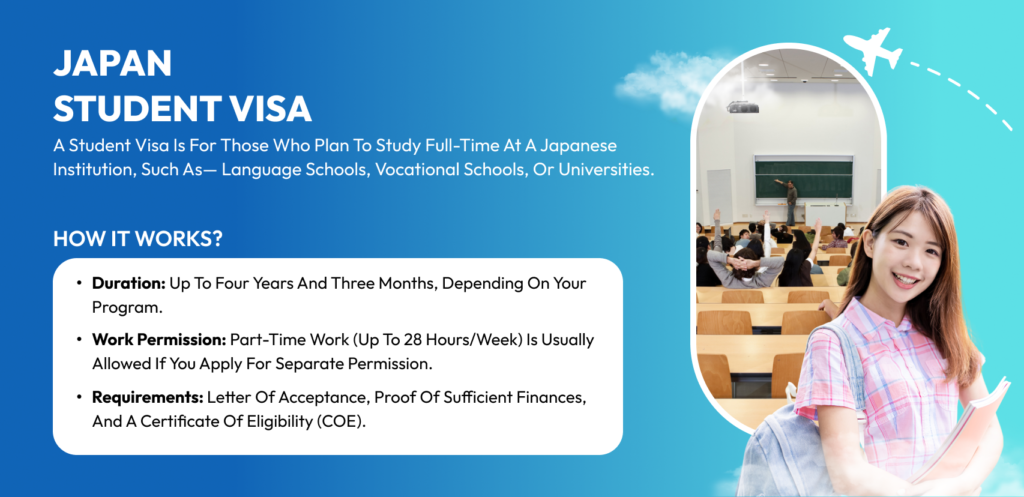
A Student Visa is for those who plan to study full-time at a Japanese institution—language schools, vocational schools, or universities.
How It Works
- Duration: Up to four years and three months, depending on your program
- Work Permission: Part-time work (up to 28 hours/week) is usually allowed if you apply for separate permission
- Requirements: Letter of acceptance, proof of sufficient finances, and a Certificate of Eligibility (COE)
Tip
If you plan on attending a higher education institution (university, graduate school, etc.), the Student Visa process is largely the same, but you’ll likely need stronger academic documentation and possibly Japanese language skills. After graduation, it’s possible to switch to a Work Visa if you find a job.
Work Visas
Work visas are for individuals employed by Japanese companies or organizations in specific fields. The most common categories include:
Engineer/Specialist in Humanities/International Services
- The most common working visa type, this covers a broad range of professional roles (IT, marketing, international relations, etc.)
Highly Skilled Professional

- For advanced roles with high-level expertise; offers fast-track to permanent residency in some cases. However, this visa is typically bound to your specfici job: if you get a new job, you may require a new visa
Business Manager
- For setting up or running a business in Japan; requires minimum capital of around 5 million yen and a dedicated office space
Key Points
- Valid for 1–5 years, renewable
- Employer sponsorship is required
- You may change jobs as long as the new role is similar to your visa category
Working Holiday (Designated Activities)
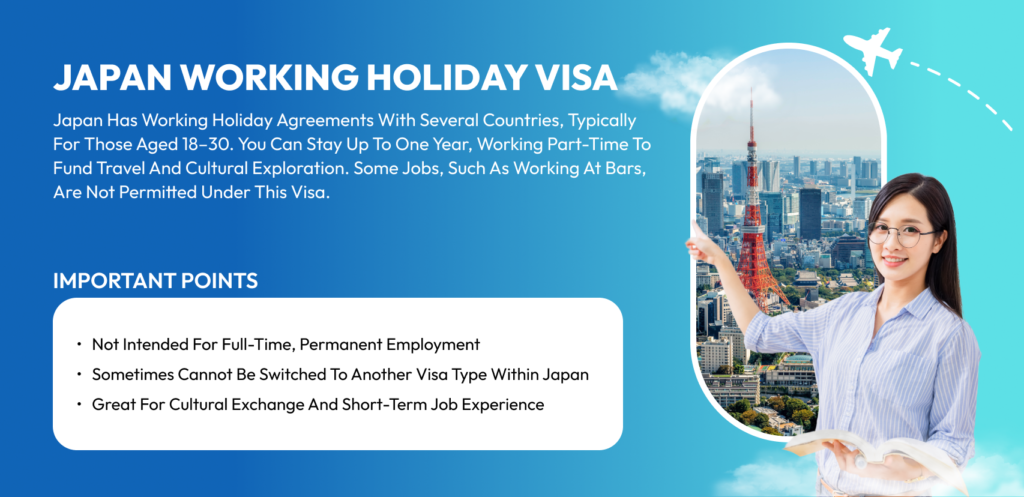
Japan has Working Holiday agreements with several countries, typically for those aged 18–30. You can stay up to one year, working part-time to fund travel and cultural exploration. Some jobs, such as working at bars, are not permitted under this visa.
Important
- Not intended for full-time, permanent employment
- Sometimes cannot be switched to another visa type within Japan
- Great for cultural exchange and short-term job experience
Spouse Visa
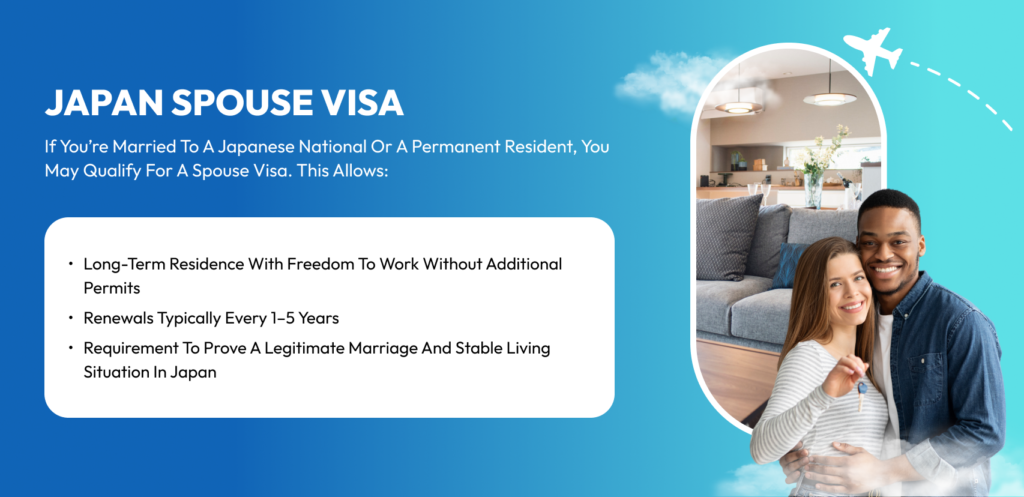
If you’re married to a Japanese national or a permanent resident, you may qualify for a Spouse Visa. This allows:
- Long-term residence with freedom to work without additional permits
- Renewals typically every 1–5 years
- Requirement to prove a legitimate marriage and stable living situation in Japan
If marital status changes (e.g., divorce), you must update your visa status accordingly.
Internships (Designated Activities Visa)
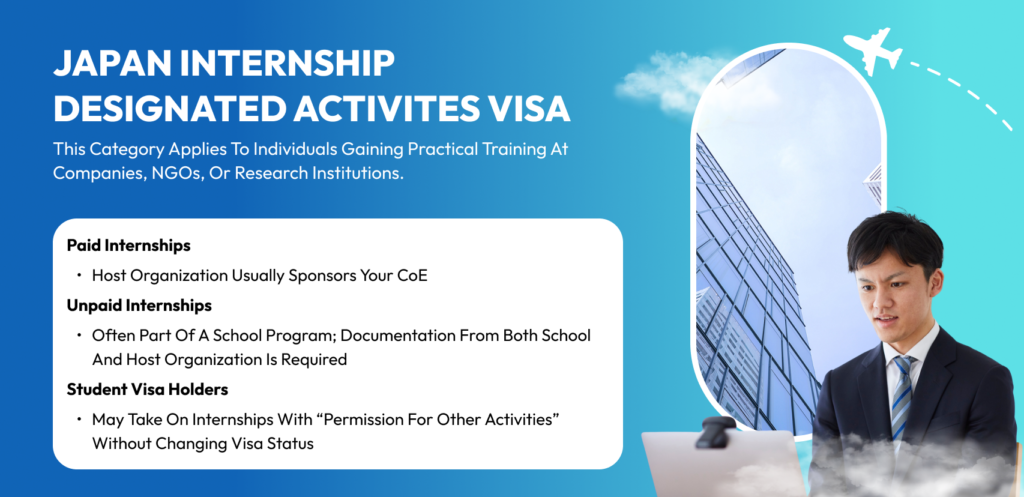
Japan does not have a formal “Internship Visa.” Instead, internships fall under a Designated Activities Visa. This category applies to individuals gaining practical training at companies, NGOs, or research institutions.
Key Points
Paid Internships
- Host organization usually sponsors your CoE
Unpaid Internships
- Often part of a school program; documentation from both school and host organization is required
Student Visa Holders
- May take on internships with “Permission for Other Activities” without changing visa status
Artist Visa
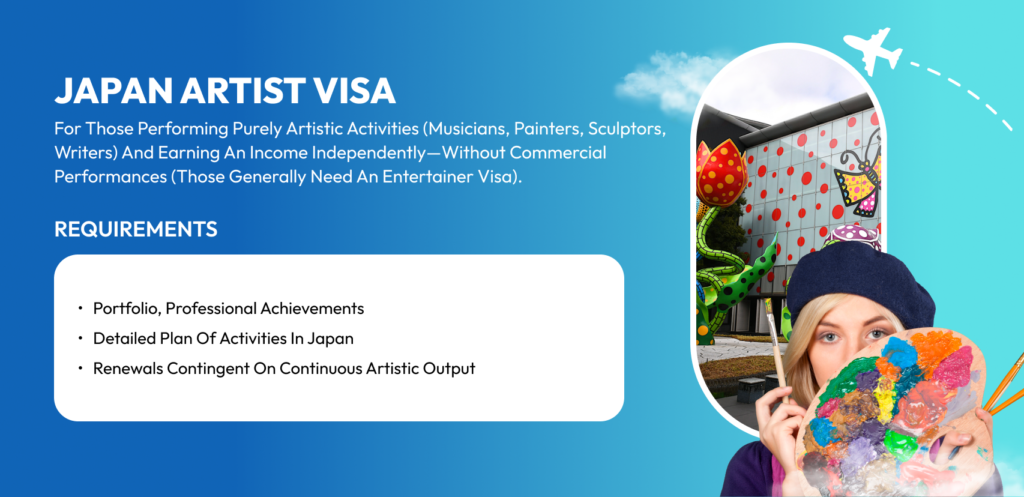
For those performing purely artistic activities (musicians, painters, sculptors, writers) and earning an income independently—without commercial performances (those generally need an Entertainer Visa).
Requirements
- Portfolio, professional achievements
- Detailed plan of activities in Japan
- Renewals contingent on continuous artistic output
Digital Nomad
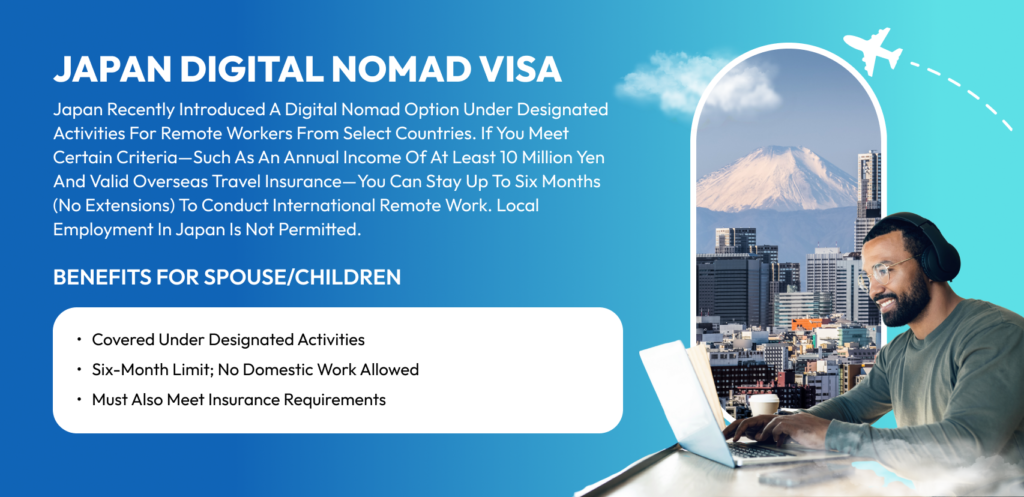
Japan recently introduced a Digital Nomad option under Designated Activities for remote workers from select countries. If you meet certain criteria—such as an annual income of at least 10 million yen and valid overseas travel insurance—you can stay up to six months (no extensions) to conduct international remote work. Local employment in Japan is not permitted.
Spouse / Children
- Covered under Designated Activities
- Six-month limit; no domestic work allowed
- Must also meet insurance requirements
For the official list of eligible nationalities and detailed conditions, check the Immigration Services Agency.
Which Visa Is Right for You?
Given the variety of visa types and rules, choosing the best fit can be challenging. Consider these steps:
- Consider and Clarify Your Purpose
- Studying, working, starting a business, or cultural exchange?
- Check Requirements
- Confirm the specific documents (CoE, financial proof, sponsor, etc.) needed.
- Consult Experts
- Immigration lawyers or certified visa consultants can offer personalized advice.
Remember that switching visa categories later may require meeting new conditions and can take time. Whenever possible, plan ahead based on your mid- to long-term goals in Japan.
This article provides general information only. Visa regulations can change, and individual cases vary. For the latest updates and personalized advice, consult official sources (e.g., the Ministry of Foreign Affairs, Immigration Services Agency) or a legal professional.

